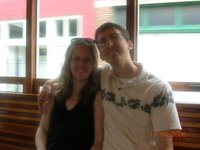
Daniel Dennett, Mother Theresa, and Sigmund Freud walk into a bar. Who do you suppose gets up off the ground the least confused? . . . It's just an introductory joke I made up.
Below in block quotes is a comment I copied from a blog post by Richard Beck. He responds to Daniel Dennett's judgment of Mother Theresa saying,
I see [Dennett's] point. But again, I think he's working with the Freudian simplification: Faith and doubt work along a simple continuum. If she expresses doubt she's got to be an atheist (or she's confused).
But scholars of the religious experience have long said that faith and doubt are two sides of the same coin. Placing them in a binary tension misses vast swaths of the religious experience.
In short, I think a part of what these essays can accomplish is to expose these binary models found in people like Freud and Dennett as well as in many Christians sitting in churches (the healthy-minded who dismiss the sick soul and avoid lament).
The "she" referred to is the saint now known as Mother Theresa. One thing the blog post claims is that not all religious varieties fall into an either/or category of atheism or theism. Faith isn't a light switch that is either on or off. Freud, on the other hand, believed that even if a legitimate faith that was somehow out of science's reach did/could exist, no one would accept that faith because people will only accept faith to provide consolation of their anxieties. People who live with the tension of faith and doubt, like Mother Theresa in India and like Jesus enduring shame, seem to be phenomena Freud ignored. Put simply, Dennett, an athiest, tried to put Theresa in the category of atheist because she doubted.
We trained hard in soccer. Our abilities were sharpened up. Our skills developed, our speed and agility heightened, we scrimmaged the girls' varsity team and won, handily. We were oriented well toward soccer. Then, we played our first real game of the season and lost decisively. For the next practice time, we didn't go back onto the field. We went inside for "chalk talk". If we could've we would've watched video clips to help rehash the most painful parts of our loss in disbelief. Now soccer, the game we thought we knew more or less, had dis-oriented our team. Eventually, we pushed past the loss and somehow ramped our training up even more. In fact, to an extent, the pain of the loss pushed us. The dissatisfaction with loss motivated us toward becoming a better soccer team. We cursed the defeat that eventually blessed us. Whether or not we won a game, that defeat and the practice that followed made every game richer. Soccer became our master again, so to speak. It re-oriented us to soccer in a more respectful way.
Eventually, doubting Theresa recognized God's presence in the times she had been most convinced of God's absence. How long was this sense of God's absence? Decades. She must've passed through dark times of dis-orientation, . . . but apparently later felt re-oriented in a new way more fully aware of darkness. She cursed the doubt that later made her feel most deeply united with Jesus.
I follow Beck in the above comment that "faith and doubt are two sides of the same coin." The Biblical Psalms, for example, witness to orientation, dis-orientation, and re-orientation. The over-arching story of the Bible tells of good, bad, then better. So, doubt isn't the end of faith; it's the beginning of faith's new birth.
In my own story . . . when the recognition for my need overcame the fear of confessing it, I received Jesus as my/the Redeemer and Master of myself/the world. Still wet from my watery grave, I was beginning to feel God's rescue as well as I understood it. Then, a feeling of God's absence replaced the sense of salvation. My understanding was disoriented, confused. Could I continue to practice my faith? If I want to know Christ and the power of his rising, I must share in his suffering, conform to his death.


